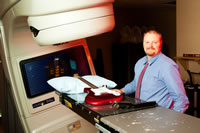Jason Frazier
 Jason Frazier pursued medical physics because of accidental timing.
Jason Frazier pursued medical physics because of accidental timing.
Originally a recording industry major, the MTSU physics grad admits he never even heard of the field, but two physics classmates had and filled him in. Just as he started researching it, someone close to Frazier had gotten test results indicating pre-cancerous cells.
"That was an opportunity to look around the field," he said. "It was a direction."
The way Frazier wound up in physics was almost as accidental. He left his RIM major opting for computer engineering with a focus on electronics. That meant he had to take Algebra-based Physics I. And that's all it took.
"I got a lot out of it," he said. "It was so much hands-on stuff that was directly related to the physics principles we studied."
After doing well at MTSU, conducting lots of undergraduate research and stumbling across medical physics, Frazier finally learned what a medical physicist does. Medical physicists work with oncologists to create treatment plans to ensure patients receive the right radiation dose in the correct area. They develop and oversee quality assurance procedures for Linear Accelerators and other treatment devices used to treat patients. Medical physicists also help develop better imaging techniques for mammography, CT, MRI and ultrasound. He went to Vanderbilt University and earned a masters in medical physics. He has been working as a medical physicist for five years, the last two in Murfreesboro.
"I enjoy working with the accelerators and having an effect and impact on the patients and their treatments and staff as well," Frazier said.
Not a bad career to find by accident.
If you want to check out something cool being done with muons, go to http://map.fnal.gov/muon-accelerator/research-goals.shtml.


